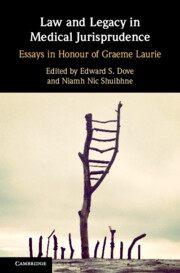Book contents
- Law and Legacy in Medical Jurisprudence
- Law and Legacy in Medical Jurisprudence
- Copyright page
- Contents
- Contributors
- Foreword
- Preface
- Table of Cases
- Table of Legislation
- Abbreviations
- Introduction
- 1 ‘Doing’ Medical Law and Ethics
- 2 A Philosopher Looks at ‘Law and Medical Ethics’
- 3 Thinking Outside the Box
- 4 The Public Interest in Health Research
- 5 Taking the Legacy Forward
- 6 On the Importance of Impact on Policy and Legacy
- 7 Breathing Life into Law
- 8 Biomedical Research Policy
- 9 The Burden of History
- 10 Body Parts and Baleful Stars?
- 11 The Legacy of the Warnock Report
- 12 ‘Only Time Will Tell’
- 13 Integrating the Biological and the Technological
- 14 UK Biobank and the Legal Regulation of Genetic Research
- 15 Overcoming Regulatory Impasse in Stem Cell Research and Advanced Therapy Medicines in Argentina through Shared Norms and Values
- 16 Institutions, Interpretive Communities and Legacy in Decision-Making
- 17 Towards a New Privacy
- 18 A Tale of Two Legacies
- Afterword
- Index
5 - Taking the Legacy Forward
Reflections on Graeme Laurie’s Approach to Liminality and Its Relevance for the Ethics and Governance of Reproductive Technologies
Published online by Cambridge University Press: 23 December 2021
- Law and Legacy in Medical Jurisprudence
- Law and Legacy in Medical Jurisprudence
- Copyright page
- Contents
- Contributors
- Foreword
- Preface
- Table of Cases
- Table of Legislation
- Abbreviations
- Introduction
- 1 ‘Doing’ Medical Law and Ethics
- 2 A Philosopher Looks at ‘Law and Medical Ethics’
- 3 Thinking Outside the Box
- 4 The Public Interest in Health Research
- 5 Taking the Legacy Forward
- 6 On the Importance of Impact on Policy and Legacy
- 7 Breathing Life into Law
- 8 Biomedical Research Policy
- 9 The Burden of History
- 10 Body Parts and Baleful Stars?
- 11 The Legacy of the Warnock Report
- 12 ‘Only Time Will Tell’
- 13 Integrating the Biological and the Technological
- 14 UK Biobank and the Legal Regulation of Genetic Research
- 15 Overcoming Regulatory Impasse in Stem Cell Research and Advanced Therapy Medicines in Argentina through Shared Norms and Values
- 16 Institutions, Interpretive Communities and Legacy in Decision-Making
- 17 Towards a New Privacy
- 18 A Tale of Two Legacies
- Afterword
- Index
Summary
This chapter reflects on liminality, a guiding concept in the project that brought both authors to Edinburgh and has featured prominently in Graeme Laurie’s most recent work. It introduces the concept of liminality and discusses Laurie’s framing and use of the term before going on to illustrate how both the concept and Laurie’s approach to it have shaped and facilitated further research on the ethics and governance of reproduction. The chapter considers the wider implications of Laurie’s contributions to the field, drawing out some of the key themes of his work on liminality, namely the processual, the experiential and the ‘quality of in-between-ness’. It provides new perspectives by applying these themes to research on the ethics and regulation of surrogacy as well as artificial womb technology. The chapter argues for the relevance of liminality as an analytical framing device, to reveal important lessons for ethics and law beyond the realm of health research regulation. Finally, the opportunity is taken to reflect on Laurie’s guidance as a project leader and the ways in which the authors’ own liminal identities in the project laid the foundation for their future as researchers.
- Type
- Chapter
- Information
- Law and Legacy in Medical JurisprudenceEssays in Honour of Graeme Laurie, pp. 110 - 126Publisher: Cambridge University PressPrint publication year: 2022

